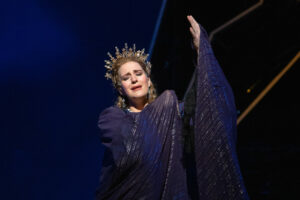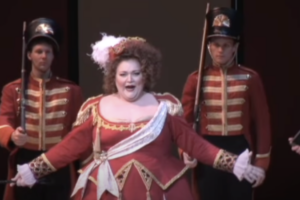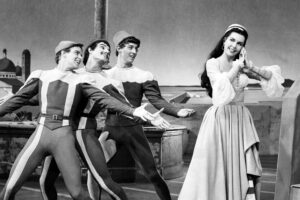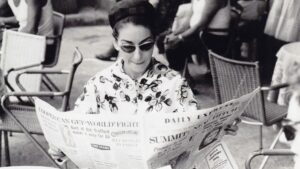

When he bought the isle of Manhattan
For twenty-six dollars and a bottle of booze,
And they threw in the Bronx and Staten …
We’ve tried to run the city—but the city’s run away —
And now, Peter Minuit—we can’t continue it…”
Thus Lorenz Hart, in a sly little song called “Give It Back to the Indians” that was un-P.C. even for 1934. He was lamenting the ruin contemporary trends had wrought on the perfections of New York City, and there are those of us who feel the same eighty years later.
Well, the Lenape Nation felt it first. They inhabited this wonderfully fertile hunting preserve for centuries, with never a thought for its value as a commodity. Then the Dutch showed up, lacking (the libretto of Purchase of Manhattan suggests) any other concept of value. As a step towards correcting a historical record muddied by Rodgers & Hart, Washington Irving and many another mythographer, our island’s indigenes, now domiciled about the West, have produced the necessary first salvo for any self-respecting culture: An epic opera, or, to be more precise, “a concert opera.” Purchase of Manhattan was given its world premiere on Thursday evening at the Marble Collegiate Church on Fifth Avenue.
Opera is a catch-all term nowadays for any event involving music and text, with drama expressed through singing. Purchase of Manhattan might be more cautiously defined as a secular oratorio, except it’s not just secular—the Lenape spirit world is serenely represented and the noisy Dutch are given a hymnal moment. Collegiate Church, descendant and heir of the Dutch Reformed Church of Peter Minuit, hosted the occasion partly to make amends for its dishonorable distant past, and the event was a benefit (suggested donation $24—get it?) for a Lenape Center which members of the tribe hope to establish on the island.
There isn’t much in the way of action to the piece, which depicts the first contact between these mutually bewildered cultures, and its stately progress might be dull at great length. For one hour, though, with ideal forces, Purchase had no trouble holding our attention. It qualifies as operatic fare not only for its historic resonance but because the composer, Brent Michael Davids (a Mohican), in addition to his other talents (he has composed for everyone from Kronos to Chanticleer), writes gorgeously for the operatic voice, and there were three splendid soloists to perform it.
Stephen Powell, a baritone well known around town from his roles with the New York City Opera and many other groups, sang a Lenape chieftain with a ringing tone and easy dignity. John Bellemer, an American tenor who does most of his singing in Europe, took the unsympathetic role of Director General Minuit with lyric clarity and an easy surge to an impassioned top.
The duet of these two uncomprehending figures, one marveling at the beauties of the island, the other calculating their practical worth, was perhaps a missed opportunity—duets at crossed purposes are a staple of comic opera. Davids, however, was not aiming for comedy but, rather, a bitter irony and a depiction of crossed purposes. He and his co-librettist, Joseph Bruchac (Abenaki), focus on the intentions of each side and the crossing of their signals. (The two choruses find each other’s music incomprehensible and barbaric.)
Happily, Purchase did not bore us (as I will now proceed to do) with mentioning the secret weapon by which Western Europe enslaved the planet: the notion of private property, unknown elsewhere and enforceable by gunpowder. The meaning is clear: The Dutch thought they were buying sole occupation of the land with sixty guilders’ worth of trinkets; the Indians thought it was a friendship gift, implying they could now share hunting rights with the strangers. Property is theft.
The truly extraordinary singing of the evening came from a personified Spirit of the Land, an earth-mother figure, performed by Alexandra Loutsion. She filled the enormous room with gorgeous earth-mother sound, so deep and resonant that I thought her a contralto, then high (though the role is not written very high), flowering without a break or a seam. Loutsion’s biography lists Fidelio, Anna Bolena and Handel’s Armida among her roles; she has sung Nico Muhly’s Dark Sisters.
Not only is the voice beautifully colored and deeply moving, her words were so clear one did not need to consult the libretto, her consonants lashed with anger or molten with emotion. (The men’s words were clear, too.) It was a delight to hear Loutsion early in what should be an exceptional career, and in music so gratefully written for her.
Two small choruses, including members of eight Indian tribes, contributed a less European-sounding, more folk-ways, puzzled but peaceable crowd of Lenapes and eight greedy, hymn-singing Dutchmen, whose scrappy energy enlivened things considerably. The small orchestra, rather wind-heavy and string-light, was led with graceful enthusiasm by Sara John, and featured the plaintive, breathy sound of a native flute played by the purple-coated composer himself.
Davids’ music is what one might describe as tonal with benefits—the choral songs, in particular, reminded me of Benjamin Britten’s operas. Twisting harp and marimba, oboe and flute effects mimicked the birdsong of this forested scene and the breezes ruffling the trees (“valuable timber!” think the Dutch), twining into layers of not-quite-traditional string melodies.
There was none of the embarrassing faux-Indian color of old Hollywood (Davids has composed an orchestral score for the 1920 silent Last of the Mohicans) and if drum beats were there, they were not in dire constant powwow 4/4. Only at the very end of the presentation did an attempt to wring resolution from the conflict produce sounds a bit too familiar to be interesting.
I’d be curious to hear what Davids could produce in a true opera, with a dramatic story involving human characters—his instinct for setting the voice and allowing that most versatile of instruments to display its power is such a rare and happy one.

























Comments